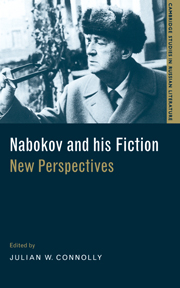Book contents
- Frontmatter
- Contents
- A note on the contributors
- A note on transliteration
- A note on abbreviations
- Acknowledgments
- Introduction: Nabokov at 100
- PART 1 ARTISTIC STRATEGIES AND THEMES
- PART 2 LITERARY AND CULTURAL CONTEXTS
- 7 Nabokov's (re)visions of Dostoevsky
- 8 Her monster, his nymphet: Nabokov and Mary Shelley
- 9 Vladimir Nabokov and Rupert Brooke
- 10 Clio laughs last: Nabokov's answer to historicism
- 11 Poshlust, culture criticism, Adorno, and Malraux
- Selected bibliography
- Index
- CAMBRIDGE STUDIES IN RUSSIAN LITERATURE
7 - Nabokov's (re)visions of Dostoevsky
Published online by Cambridge University Press: 18 December 2009
- Frontmatter
- Contents
- A note on the contributors
- A note on transliteration
- A note on abbreviations
- Acknowledgments
- Introduction: Nabokov at 100
- PART 1 ARTISTIC STRATEGIES AND THEMES
- PART 2 LITERARY AND CULTURAL CONTEXTS
- 7 Nabokov's (re)visions of Dostoevsky
- 8 Her monster, his nymphet: Nabokov and Mary Shelley
- 9 Vladimir Nabokov and Rupert Brooke
- 10 Clio laughs last: Nabokov's answer to historicism
- 11 Poshlust, culture criticism, Adorno, and Malraux
- Selected bibliography
- Index
- CAMBRIDGE STUDIES IN RUSSIAN LITERATURE
Summary
A writer's relationship to the literary legacy of the past finds expression in a multitude of forms. Theoretical works by Yury Tynianov, Harold Bloom, and Gérard Genette, among others, have outlined some of the ways in which writers may articulate their attitudes toward the work of their predecessors. Vladimir Nabokov's attitude toward writers of the past was itself multi-faceted. When examining his approach toward the legacy of the past, readers need to distinguish between the declarations he made in interviews and lectures, and the more subtle reminiscences or allusions he incorporated into his literary texts. This is especially true in the case of Nabokov's treatment of Fedor Dostoevsky. While there were enormous differences in artistic temperament, stylistic technique, and philosophical world view, and Nabokov's professed antipathy for Dostoevsky's excesses was both highly critical and highly public, the evidence of his prose fiction reveals a more complex relationship. When one looks at the entire body of Nabokov's fiction, one must conclude that Dostoevsky was not just a “figure of fun” to Nabokov the writer. On the contrary, it is apparent that Nabokov's views on Dostoevsky underwent a complex evolution. Most important to Nabokov, perhaps, were Dostoevsky's remarkable explorations of human consciousness. As we shall see, the young Nabokov found in Dostoevsky's work a stimulating set of ideas and techniques that helped shape his own unique portraits of human imagination and obsession. Dostoevsky's fiction provided Nabokov with provocative models of human imagination, both in terms of the kinds of visions attributed to his fictional characters and in terms of the way these visions are conveyed to the reader (that is, through particular kinds of first-person, confessional narratives).
- Type
- Chapter
- Information
- Nabokov and his FictionNew Perspectives, pp. 141 - 157Publisher: Cambridge University PressPrint publication year: 1999
- 1
- Cited by

